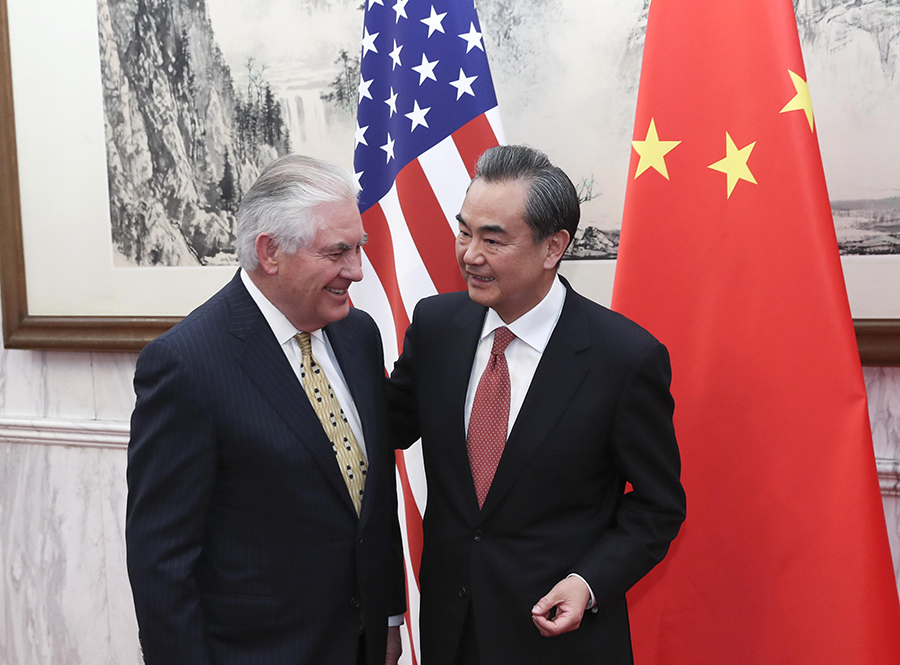Media Report

- Reuters reports: "China on Thursday welcomed an apparently softer tone by the United States on the North Korean nuclear and missile crisis but stressed its opposition to a U.S. missile defense system being deployed in South Korea...The Trump administration said on Wednesday it aimed to push North Korea into dismantling its nuclear and missile programs, which are in violation of U.N. Security Council resolutions, through tougher international sanctions and diplomatic pressure. 'The United States seeks stability and the peaceful denuclearization of the Korean peninsula. We remain open to negotiations toward that goal. However, we remain prepared to defend ourselves and our allies,' it said in a statement. Asked about the U.S. comments, Chinese Foreign Ministry spokesman Geng Shuang said China had noted that many U.S. officials had recently made such remarks. 'We have noted these expressions, and have noted the message conveyed in these expressions hoping to resolve the Korean nuclear issue peacefully through dialogue and consultation,' he said. 'We believe this message is positive and should be affirmed.'...A North Korean official speaking on CNN said the country would not be influenced by outside events. 'As long as America continues its hostile acts of aggression, we will never stop nuclear and missile tests,' said Sok Chol Won, director of the North's Institute of Human Rights at the Academy of Social Sciences."
- The Diplomat comments: "On April 15, 2017, Chinese Foreign Minister Wang Yi made an emergency phone call to Russian Foreign Minister Sergey Lavrov to discuss the burgeoning security crisis on the Korean peninsula...Even though Russia and China are North Korea's most important international allies, collaboration between Moscow and Beijing on the Korean security crisis has historically been confined to a multilateral rather than a bilateral framework. The recent upsurge in bilateral cooperation between Moscow and Beijing on North Korea can be explained by two factors. First, both Russia and China stridently oppose a unilateral U.S. military strike against North Korea's nuclear facilities. Second, Russian and Chinese officials believe that Moscow-Pyongyang and Beijing-Pyongyang bilateral diplomacy can pressure Kim Jong-Un to transition towards a more peaceful foreign policy course...As diplomatic solutions to the Korean security crisis have been largely unsuccessful and U.S. foreign policy has become increasingly defined by brusque unilateralism, it remains unclear whether the burgeoning Moscow-Beijing axis is able to deter a U.S. military strike against Pyongyang in the months to come."
- The New York Times reports: "Twitter on Wednesday briefly suspended the account of a Chinese-born billionaire who was using the social media service to publicize allegations of corruption against top Communist Party officials. The billionaire, Guo Wengui, also known as Miles Kwok, had in recent days added tens of thousands of followers to his account, @KwokMiles, where he posted screenshots of documents that he said suggested corruption at the highest levels of the Chinese government. China, where Twitter has a minimal presence and is blocked by the authorities, considers Mr. Guo to be a criminal. A Chinese official said last week that Interpol, the global police organization, had issued a global request for his arrest...Rebecca MacKinnon, who studies internet companies' policies and practices affecting users' freedom of expression and privacy at New America in Washington, said that many governments work with contractors or nonprofit groups to monitor social media accounts of people they are concerned about. 'Some authoritarian governments engage in a variant of this practice, monitoring accounts of critics and opponents for apparent violations of the companies' own terms of service, then flag them through the companies' abuse-reporting channels,' Ms. MacKinnon said in an email."
Calendar
- 2017-04-26 China Celebrates Launch Of 'Homemade' Aircraft Carrier
- 2017-04-25 Alibaba launches program to help 1 million U.S. businesses sell to China
- 2017-04-24 China’s Leader Urges Restraint on North Korea in Call With Trump
- 2017-04-23 Chinese jihadis' rise in Syria raises concerns at home
- 2017-04-21 Is China too tough a steel beast for Trump to tame?
- 2017-04-20 Philippines checks report of 'harassment' near China-controlled reef
- 2017-04-19 China's Xi restructures military, consolidates control
- 2017-04-18 Ivanka Trump awarded trademark approval in China, dines with Chinese president at Mar-a-Lago
- 2017-04-17 Pence Visits North Korea Border, `Heartened' by China Moves
- 2017-04-14 China Warns of ‘Storm Clouds Gathering’ in U.S.-North Korea Standoff
News
- The New York Times He Tweeted About Chinese Government Corruption. Twitter Suspended His Account.
- Reuters China welcomes U.S. saying it's open to talks on North Korea
- Reuters China, Europe pledge closer aviation ties ahead of landmark jet launch
- Bloomberg China's $290 Billion New Area Lifts Hope for Better Cities
- The New York Times New Balance Court Ruling in China Is Rare Win Against Piracy
- Bloomberg China Must Tread Carefully on Outflow Controls, RBA's Lowe Says
- The Washington Post The $1-an-hour wages at the Ivanka Trump clothing factory aren't the point
- The Financial Times China economic upturn threatens emissions gains
- The Associated Press Duterte says he won't raise sea feud win vs. China in summit
- The Wall Street Journal Trump Administration Launches Probe of Aluminum Imports
- The New York Times The Tech Challenge of Reporting Under China's Watchful Eye
- USA Today Hong Kong widens crackdown, arrests 9 more activists
- The Financial Times China steel association pushes back after Trump moves toward limiting imports
Commentary
- The Diplomat What's Behind Sino-Russian Cooperation on North Korea?
- Quartz China's most wanted man is in the United States
- The Wall Street Journal: China Real Time Report China Offers Rare Insight Into Punishment for Speaking With Foreign Media
- Bloomberg Views Why China's Drones Are Taking Off
- The Hill China welcomes Trump's openness to talks with N. Korea
- Huffington Post Can North Korea Transform U.S-China Relations?
- Reuters Opinion U.S. says strategy on North Korea centres on sanctions, open to talks
